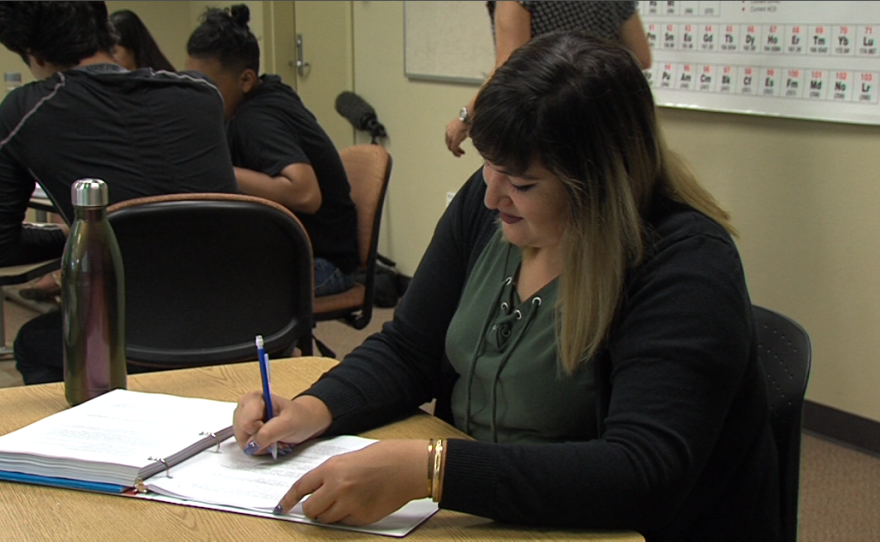Cuyamaca College saw a seven-fold increase in the number of students passing college math last year. Instead of requiring underprepared students to catch up on high school math first, it put them in college math with extra help. Mesa College did the same for English and saw its pass rate double for students in the pilot program.
Now, state lawmakers want every community college to make the change.
Assembly Bill 705 would prohibit them from placing a student in a remedial course “that lengthens their time to complete a degree,” unless the college can prove the student would fail. Remedial classes do not count toward an associate’s degree nor a university transfer.
RELATED: Cuyamaca College Offers Case Study In Eliminating The ‘Math Pipeline Of Doom’
In order to succeed under the new model, the bill essentially corners colleges into doing what Cuyamaca and Mesa have done — concurrently enroll students in college-level math and a remedial breakout course — though it doesn’t explicitly require them to.
“The research behind these changes is so clear that it’s sort of hard to argue at this point,” said Katie Hern, co-founder and director to the California Acceleration Project, a statewide faculty workgroup that has been researching the model and supports the bill. “It’s hard to argue that community colleges should be able to keep doing what we’ve been doing when the results are so bad for traditional approaches and so much better when we reform our placement practices and implement corequisite models.”
The bill would also do away with the standardized placement tests community colleges give to incoming students. Instead, they’d use high school grades, which research has shown to be a more reliable indicator of whether a student needs remediation.
Grossmont College, and several other colleges in the state, have already moved away from placement tests with strong results. But Grossmont’s math department co-chair said she worries AB 705 goes too far in placing limits on remediation.
“The language in this bill is both strict and general at the same time. What does it mean? We cannot require a student to take a remedial course unless it is absolutely necessary, or that all community colleges will have to add support courses to all of their college-level courses?” said Shirley Pereira, referring to the section of the bill that limits remedial placement.
Pereira said she worries about removing options for students, especially military veterans, former housewives and other nontraditional students who are far removed from high school coursework.
“The number of remedial courses should be minimized at all of our colleges,” she said. “We do this by placing students correctly, but it does not mean that we get rid of all of our remedial courses. Remember the community college charge: access is first and foremost.”
RELATED: Sweetwater Bets On Game Theory (And More) To Solve California’s Remedial Math Problem
Hern said the bill would not limit options; it would simply require colleges to look deeply at whether the remedial option is best for students.
“It really sort of shifts the burden of proof away from students having to prove that they should have access to a college-level course, and it shifts to colleges having to prove that students should not have access to the course because they are highly unlikely to succeed there,” Hern said.
When Cuyamaca College allowed students who needed remediation to go straight into a college-level course, the pass rate soared. It went from 10 percent to 67 percent. At Mesa College, 75 percent of students enrolled in a pilot program that eliminated remedial English passed college-level English. That is compared to 38 percent of students not in the pilot.
Pereira pointed out change under the bill would not be swift, especially for larger colleges. In addition to shifting the class schedule, teachers must shift how they teach. With students coming in at various levels, they must be able to give individualized support.
It is not clear how quickly the changes would need to be implemented under the bill. First, the governor must sign it. He has until Sept. 30.
The California State University is currently implementing similar changes.






